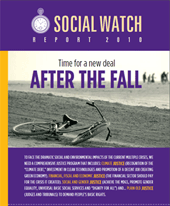Publications

MÉXICO, CENTROAMÉRICA Y LA SOCIEDAD CIVIL
|

The reality of poverty and inequities, as perceived from communities and grassroots differs from top-down views.
|

06 OCCASIONAL PAPERS - SOCIAL WATCH - BEIJING AND BEYOND - Putting gender economics at the forefront - 15 years after the IV World Conference on Women
|
»

Social Watch 1996 The "trial edition" was published in March 1996. The first part of the publication introduces the Social Watch idea in the context of the follow-up of the WSSD and the FWCW. The second one contains national reports from NGOs already engaged in this follow-up in thirteen countries. 124 pages.
|

Wirtschaftliche Phänomene beschreibt man gerne mit Metaphern, die mit Wasser zu tun haben: Geld »fließt«, Wohlfahrtsgewinne »sickern« zu den Armen durch, Geld»quellen« »sprudeln« oder »versiegen«, Kapital »strömt« …
|

The results of the 2007 Social Watch Gender Equity Index (GEI) clearly demonstrate that a country’s level of wealth does not automatically determine its degree of equity. Rwanda, one of the world’s least developed countries, ranks third on the list of GEI scores, after Sweden and Finland, thanks to intensive affirmative action efforts. In the meantime, a number of high-income countries rank far down on the list. The evolution of the GEI between 2004 and 2007 reveals a few global advances, but the general trend seen throughout the world is either very slow progress or no progress at all. The United States, a high-income country, is one of the 10 countries that have experienced the greatest regression. Obviously, the key to gender equity lies not in a country’s economic power, but rather in its government’s political will.
|

More than half the women in the world live in countries that have made no progress in gender equity in recent years. This is the main conclusion of the Social Watch 2008 Gender Equity Index (GEI) which, for the first time, shows recent evolution and trends in bridging the gap between men and women in education, the economy and empowerment.
The GEI 2008 illustrates that the greater equity levels to be found in education are not paralleled by acceptable levels in the economic field nor in the empowerment of women. Political empowerment is the area where most progress has been made in recent years as a result of active policies, yet economic equity shows disparate results, with as many countries regressing as those where there is progress. In education equity is comparatively closer, but the trend for many countries is to regress.
|

Summary of the analyisis of four case studies from the Social Watch National Coalitions How successes and failures can be valuable as lessons learnt for other national coalitions.
|
- « first
- ‹ previous
- 1
- 2
- 3
- 4
SUSCRIBE TO OUR NEWSLETTER



